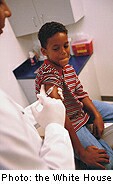
TUESDAY, April 6 (HealthDay News) The traditional seasonal flu vaccine may have increased the risk of infection with pandemic H1N1 swine flu, according to the results of four new studies by Canadian researchers.
In one study, the researchers used an ongoing sentinel monitoring system to assess the frequency of prior vaccination with the seasonal flu vaccine in people diagnosed with H1N1 swine flu in 2009 compared to people without swine flu. The researchers found that seasonal flu vaccination was associated with a 68 percent increased risk of getting swine flu.
The other three studies included additional case-control investigations in Ontario and Quebec, as well as a transmission study in 47 Quebec households that were hit with swine flu. In these studies, the researchers found that seasonal flu vaccination was associated with a 1.4- to 5.0-times greater risk of having swine flu.
The studies, published April 6 in the online journal PLoS Medicine, don’t show whether there is a true cause-and-effect relationship between seasonal flu vaccination and subsequent swine flu illness, or whether the association was possibly due to a common factor among the people in the study, said principal investigator Danuta Skowronski, of the British Columbia Center for Disease Control in Vancouver, and colleagues.
However, the findings may raise questions about the biological interactions between pre-existing and new pandemic influenza strains.
The researchers noted that the World Health Organization has recommended that protection against pandemic swine flu be included in future seasonal flu vaccines. This will provide direct protection against pandemic swine flu and eliminate any risk that may have been due to the 2009 seasonal vaccine, which did not include protection against swine flu.
More information
The U.S. Centers for Disease Control and Prevention has more about the H1N1 flu.

